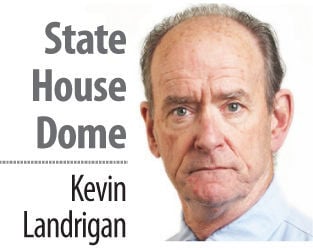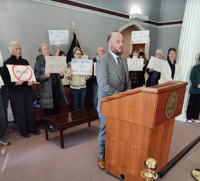THE STARTLING AGREEMENT on a compromise state budget last week took many by surprise for how quickly it came together.
It is extremely unusual for the Legislature to agree on a two-year spending plan without weeks of negotiations over the most minute of details.


The last time was a decade ago, when the Republican-led House of Representatives was unable to pass its own budget.
As a result, the state Senate under then-President Chuck Morse, R-Salem, passed a budget to its liking and the House had few options other than to give it a quick nod.
This time the dynamics were different, as a closely divided House had managed to come up with its own budget.
Now that it’s over, we can identify some of the winners and losers.
Winner: Senate President Jeb Bradley, R-Wolfeboro. No one understands the financial interworking of state government better than Morse, but surely he was smiling as he watched Bradley put the grand bargain together.
What makes this all the more impressive was Bradley had never been involved in writing a state budget during his 14 terms in the Legislature (eight in the Senate, six in the House), and all five Republicans on the Senate Finance Committee were newcomers to the process.
Bradley made the deal happen by getting buy-in from all the key stakeholders.
Loser: House Finance Chairman Ken Weyler, R-Kingston. Weyler had wanted to take the budget back to the future by paring back how much of the state’s business taxes must support public education programs.
Weyler said House Democratic critics and some in the media unfairly branded this as “cutting” state aid to education.
The Senate did not want to have to deal with the same branding, so the idea was shelved in the final document.
Winner: Gov. Chris Sununu. Time after time, Senate budget writers brought back from the dead proposals from the governor that had gone nowhere in the House.
These included $4 million to promote teaching in science and math, $1 million for a civics textbook and $500,000 for a statue honoring the late teacher/astronaut Christa McAuliffe.
The only significant omission from what the governor had offered was $75 million in surplus for school construction projects.
Loser: “Middle Tier” Group 2 first responders. These are the 1,800 police and fire employees in state, county and municipal government who had their pension benefits cut in 2011.
Senate Democratic Leader Donna Soucy of Manchester vainly tried to get the Senate to embrace at least some of this proposal from the House budget.
Bradley said he was optimistic an agreement could be reached in the future.
The solution could lie in giving these employees a “pension multiplier,” which would increase their pension depending on the number of years someone remains on the payroll.
Supporters of these changes would have to do without changes in the definition of “income-eligible” for determination of future pension benefits. Bradley and other Senate critics said this could bring back the practice of “spiking,” which allows a worker to artificially inflate their pension by having unused sick or leave time added to their final year’s salary.
Winner: Medicaid providers. In his February budget, Sununu proposed a 3% increase in payments to these non-profit providers. The final $134 million increase in provider rates translates to more like a 11%-12% raise.
Loser: Immigration advocates. Those on the left thought they had a good shot of keeping Sununu’s Northern Border Alliance out of the compromise budget. But the proposal to spend $1.4 million in federal grants for beefed-up state and local law enforcement of illegal immigration and drug trafficking along the Canadian border made it to the finish line.
New press aide for Hassan
Sahil Mehrotra has become press secretary for U.S. Sen. Maggie Hassan, D-N.H.
She most recently held that role in Everytown for Gun Safety, the pro-gun control group started by former New York Mayor Michael Bloomberg.
White House to regroup
Word is the Biden White House will move quickly to make an alternative recommendation for judge on the U.S. Circuit Court of Appeals now that former Attorney General Mike Delaney has withdrawn.
The turnaround will be sought out of concern that it will become much more difficult to get movement on judgeships during the election year in 2024, according to Carl Tobias, Williams Chair in Law at the University of Richmond School of Law.
An easy option could be to promote someone from the ranks of the U.S. District Court bench, such as Landya McCafferty, who became the first woman to preside at the Concord federal courthouse.
House Dems lose one
State Rep. Shaun Filiault of Keene became the first legislator to swap parties, changing from Democrat to independent last week after he had a falling out with House Democratic Leader Matt Wilhelm of Manchester.
Filiault had wanted to compromise with state Senate GOP leaders in hopes of getting his bill (HB 315) passed to get rid of the so-called “gay panic” defense.
Sen. Daryl Abbas, R-Salem, has been trying to revive his unrelated proposal to amend the state Constitution to enshrine the first-in-the-nation presidential primary (CACR 9).
The House Election Laws Committee had voted unanimously to shelve it.
Abbas approached House leaders and offered to put the two proposals onto a combo platter.
Wilhelm was against that offer, which prompted Filiault’s departure.
In an about-face Thursday, the Senate passed Filiault’s bill in an amended form, sending it back to the House for its review.
Abbas presented that olive branch.
In turn, the House put Abbas’ constitutional amendment on the table rather than kill it.
House Deputy Speaker Steven Smith, R-Charlestown, had made the move to keep Abbas’ amendment barely breathing.
At this late stage of the session, it will take a super-majority in the House to act on that proposal.
Much like Vermont independent Sen. Bernie Sanders, Filiault said he’ll continue to support the same causes despite his party switch.
“My heart hasn’t changed though. I will always vote what’s best for Ward 2, Keene, & NH. usually, that’s Dem values,” Filiault tweeted.
Earlier this year, the House failed by a single vote to pass a pro-abortion rights bill because Filiault voted incorrectly.
Pence on Social Security
Former President Donald Trump’s refusal to deal with entitlement reform is one of the key reasons Mike Pence said he decided to run for president.
During an interview Friday, Pence said if the U.S. waits another 25 years to fix Social Security, “all the choices are really bad ones.”
Pence said reform begins with having a conversation with the American people to point out the serious debt crisis the country faces.
“I am not willing to walk by on the other side of the road and pretend it is not the serious crisis that it is,” Pence said.
His idea of reform would be to change the system for those under 40, to include allowing them to invest some of their payroll taxes into a mutual fund.
“The current return on the Social Security fund is 1%. If we got these younger Americans into a mutual fund that paid 2% interest, they’d be twice better off,” Pence said.
Currently, 10 million Americans who are federal employees or veterans participate in the Thrift Savings Plan (TSP), which allows them to invest part of their income in retirement plans, Pence said.
“Why shouldn’t all younger Americans under 40 have the same opportunity?” Pence asked.
A shout out to NH
The pro-free enterprise Massachusetts Fiscal Alliance was singing the praises of New Hampshire as it tried to convince the Democrat-led Legislature and corner office to give taxpayers in that state a break.
They noted the state budget deal Sununu will sign includes a quicker repeal of the state’s tax on unearned income, the now 4% Interest and Dividends Tax.
On Beacon Hill, that state’s Senate Ways and Means Committee is rejecting a cut on short-term capital gains that has the support of its Democratic Gov. Maura Healey and the House.
“I don’t know how many reports need to come out showing that Massachusetts is at an economic crossroads before the state Senate will take the issue seriously,” said Paul Craney, a spokesman for the alliance.
“New Hampshire has proved yet again that they’re serious about eating our lunch and continue to take bold steps to attract the people that Massachusetts is taking for granted.”
GOP operative recognized
The Maverick PAC, a national network of young professionals, last week honored Derek Defresne as one of its 2003 Future40 recipients.
Defresne, a partner in the AscentStrategic consulting firm with Mike Biundo, also serves as general consultant and chief strategist to U.S. Rep. Kat Cammack, R-Florida, and her American GRIT PAC.
Sanctuary city reform fails
A proposal to prevent cities and towns from adopting “sanctuary city” policies toward immigrants failed in the House last week.
Opponents successfully moved to table that Senate-passed bill (SB 132).
Abbas had narrowed this bill’s scope to apply only in cases when someone that federal authorities suspect is an illegal immigrant is arrested for a different state crime.
Some local police chiefs had come out in opposition to the proposal, fearing that it could jeopardize the cooperative relationship they have with immigration advocacy groups in New Hampshire.
The move to shelve the bill had 15 House Republicans joining all Democrats in the 203-168 vote.
Once again Thursday, House Democrats had slightly more people in the chamber than House Republicans did.
Fortunately for House Majority Leader Jason Osborne, R-Auburn, last week’s agenda contained few partisan battles.
Veteran organizer joins Pence campaign
Former Vice President Pence continues to build his campaign team following his announcement last week.
Joining the campaign as a strategic adviser is Steve DeMaura, who has worn many hats, including executive director with the New Hampshire Republican State Committee.
DeMaura was a leading spokesperson for the pro-free enterprise Americans for Job Security and had been the head of the Super PAC that backed Carly Fiorina’s GOP White House bid in 2016.
Pease fuel farm controversy
The town of Newington Board of Selectmen sent out an unusual alert to all residents about Million Air’s proposal to build a third fuel farm at the Pease International Tradeport.
Selectmen are asking the Pease Development Authority to order a public third-party review of the project’s design to see if there is a “less obtrusive option” than Million Air’s proposed location. That site abuts the Haven Well, which provides the town’s drinking water.
“The Newington Board of Selectmen have not understood yet how this project, as environmentally controversial as it is, provides the public a benefit besides private profit,” they wrote.







